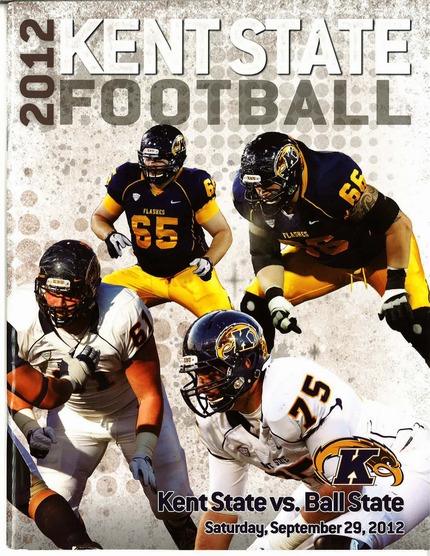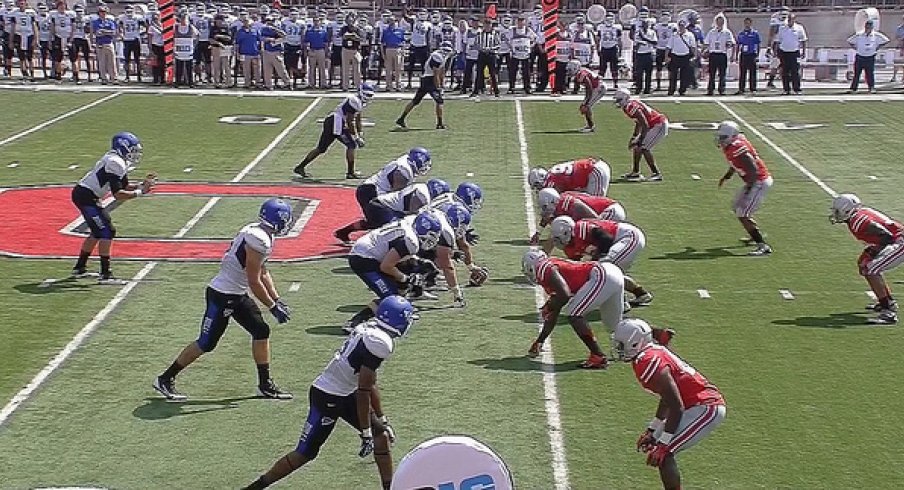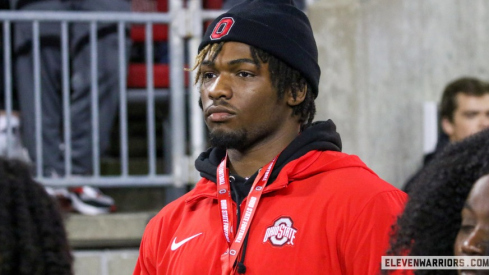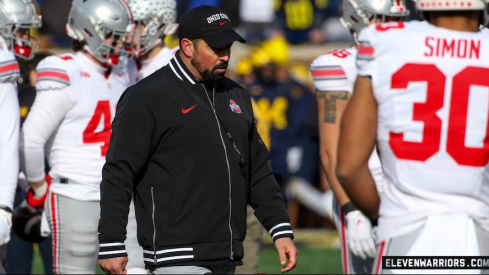Before I get started with this, I just now realized that writing an article in the middle of June about the necessity of less football in August and September is a Sisyphean task that I should probably give up on. I'm fairly certain that the remaining 900 words or so of this thing could be a copied and pasted Reader's Digest article from 1998 about Monica Lewinsky and no one would actually notice because 90 percent of you have moved on to animated .gifs of cats and dogs falling asleep on top of each other or something equally adorable.
It's already happened, hasn't it? You're seconds away from clicking your Ask.com browser toolbar and seeing what depravity the rest of the Internet can conjure up. Well joke's on you sucker, because I've already used up most of my almost-amusing jokes! It's all downhill from here!
College football is frequently the opposite of what's happening here (this is what we in the professional blogging business call "a brilliant segue"). It starts out so, so bad, and then becomes tolerable and then finally is the only thing of real meaning and substance in our lives to the point where we experience extreme symptoms of withdrawal and depression when it's gone.
The Big Ten among Power Five conferences has been frequently called out for scheduling cupcakes in the early part of the season (to avoid losing to teams focused on petty crap like "competence" and "talent"), but in truth this is a national epidemic that has especially infected the SEC.
Anyway, cheap jabs at the south aside, I wanted to find out just how many of the out of conference games that Ohio State played were actually worth watching on any level beyond "I'm so desperate to see people in an Ohio State uniform that they could reenact the Battle of Shiloh for three hours and I would neither complain or be able to tell the difference between that or a real game." But if I was going to do this right, I needed to establish some criteria and figure out what constitutes a truly crap game of out of conference football.

Noncompetitive Games Not Worth Watching
NGNWWs are defined thusly: "If the team Ohio State is playing fails to get within 14 points of the Buckeyes at any point in the second half, then it's a NGNWW and it's okay to take a nap for about 2/3rds of the 4th quarter."
Utter Garbage Games
UGGs are games where "Ohio State wins by at least 21 points and the opposing team doesn't do any significant scoring until the fourth quarter." A caveat: Eastern Michigan looking like an actual football team for 35 seconds doesn't mean anything.
So, looking at the 39 out of conference games that the Buckeyes have played in the last 10 seasons, there have been:
- 17 NGNWWs
- 15 UGGs
- A game against Florida A&M that caused me to feel legitimately bad for everyone involved
- Like five more games that just barely didn't meet my completely unscientific and made-up standard but probably should've, like that one miserable Akron game where Ohio State led 3-2 at halftime and I wondered if God was testing my faith in Jim Tressel
I'm not great at math but after some exhaustive calculations, I've discovered that 17-20ish is pretty close to half of 39. That's 50 percent of out of 39 conference games that were just total trash and really not worth anyone's time. Well, except for the teams that got paid hundreds of thousands of dollars to take one on the chin. And I guess Ohio State got to artificially raise their national profile by inflating their record against a "team" that meets that definition in the same way that White Castle burgers meet the basic definition of "meat."
That's a pretty persuasive argument for a game to happen within the confines of a completely empty stadium, but doesn't really explain why anyone would shell out their hard earned American dollars to bake in the September sun of the Midwest at the crack of noon and watch a war crime with 105,000 potential body odor issues. I've written before that sports exist to self-perpetuate, and nothing showcases this concept more than the Buckeyes curb stomping the Youngstown State Penguins every 3 to 5 years.
But a college football game in Ohio is also a social contract. People are more than happy to pay crazy amounts of money to see one game of football because it's a huge part of the culture of where we live, and it's also pretty kickass and fun. When the games are at least nominally interesting, anyway, and that's kind of my point.

It is incredibly arrogant for Ohio State or any college football program to tell their fans and supporters "we can schedule and play literally any team in the country and we know that you're gonna pay to see it, you foolish rubes ahahaha!" and then continue to offer the same product both on the field and within their stadiums. I will fully cop to generally being just Not That Invested in three of the first four games of an Ohio State due to the reasons stated above; not because I don't love the Buckeyes, but because the Buckeyes aren't really giving me all that much of a reason to love the Buckeyes.
With that said, I do think that most schools are starting to wise up, even just a teeny bit. A few years ago Barry Alvarez said that the Big Ten would stop scheduling FCS teams, which is nice but also kind of like swearing to your mom that you won't fart on your baby sister while she's sleeping anymore. That's great, but why were you even doing it in the first place? And it also ignores the fact that the removal of really terrible opponents does not mean the addition of competent ones (for good programs like Ohio State, Michigan State, Wisconsin, and so on. You could read Alvarez as implicitly bailing out Minnesota and Michigan from having to experience the terror of another FCS opponent).
Players too would probably appreciate a respite from getting their brains slammed against their skull for a week, and all the potential injuries that a meaningless game against a horrible opponent can still bring with it. Given that football players are injured approximately 100 percent of the time, maybe more games aren't the solution for a sport looking for a way to make itself safer. Coaches would also probably enjoy extra training camp time if the season started just a wee bit later.
Additionally, the current playoff system has given teams an excellent reason to start scheduling compelling games against each other. One of the big arguments against the playoff is that it would make regular season games less important, which turned out to be totally correct. Ohio State was able to schedule and lose to Virginia Tech at home and then go on to win a championship, and in the eyes of some (stupid people) that was a tragedy. I disagree. By putting less of an emphasis on the regular season, you give teams the leeway to schedule opponents that aren't an elaborate money laundering scheme for Lithuanian mobsters.
Ultimately, schools can ply fans with alcohol all they want, but if you truly want people to come to games, stop watering down the product. Start the college football season later, don't schedule any more than three out of conference games a year, and make damn sure that two of those games are against teams with a pulse. And while I don't foresee programs giving up easy cash and making the extra effort to schedule tougher opponents on a more regular basis anytime soon, especially with this mentality:
Northwestern athletic director Jim Phillips was asked about the FCS policy on Tuesday [June 2014] at the College Sports Information Directors of America convention in Orlando.
"That was really a hard decision," he said. "I don’t know if we’re sure that’s the right decision to make.”
But I do think that the tipping point has been reached, and hopefully fans will begin to pressure programs into realizing that at a certain point, there isn't a blood alcohol level high enough to make some games worth watching.


